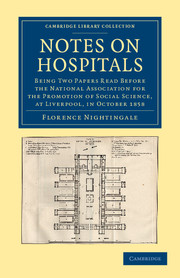
-
Select format
-
- Publisher:
- Cambridge University Press
- Publication date:
- October 2014
- July 2013
- ISBN:
- 9781139867047
- 9781108064415
- Dimensions:
- Weight & Pages:
- Dimensions:
- (216 x 140 mm)
- Weight & Pages:
- 0.17kg, 128 Pages
You may already have access via personal or institutional login- Subjects:
- Social and Population History, History, History of Medicine
Book description
Returning from the Crimea, Florence Nightingale (1820–1910) used her experience of army medicine to ameliorate civilian nursing care. She was appalled by the conditions she found, affirming that the first requirement of a hospital was that 'it should do the sick no harm'. Problems such as overcrowding and damp, in addition to lack of ventilation and proper sanitation, contributed to high mortality rates. Nightingale's belief that such suffering was preventable was seen as revolutionary. In 1859 she published her two most influential works, Notes on Nursing (also reissued in this series) and Notes on Hospitals. This collection contains the two papers she presented to the National Association for the Promotion of Social Science in 1858. Also included, from 1857, is her evidence to the royal commission on the British army's sanitary conditions. Three illustrated articles on hospital design, published in The Builder in 1858, form an appendix to the work.
Contents
Metrics
Altmetric attention score
Full text views
Full text views help Loading metrics...
Loading metrics...
* Views captured on Cambridge Core between #date#. This data will be updated every 24 hours.
Usage data cannot currently be displayed.
Accessibility standard: Unknown
Why this information is here
This section outlines the accessibility features of this content - including support for screen readers, full keyboard navigation and high-contrast display options. This may not be relevant for you.
Accessibility Information
Accessibility compliance for the PDF of this book is currently unknown and may be updated in the future.


